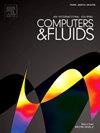混合量子物理信息神经网络:迈向高速流的有效学习
IF 3
3区 工程技术
Q3 COMPUTER SCIENCE, INTERDISCIPLINARY APPLICATIONS
引用次数: 0
摘要
本研究将混合量子物理信息神经网络(HQPINN)与经典物理信息神经网络(pinn)和全量子神经网络(QNNs)进行对比,对高速流体模型进行基准测试。HQPINN架构将参数化量子电路(PQC)与经典神经网络并行集成,通过物理信息损失进行训练。在谐波、非谐波和跨音速基准测试中,hqpinn表现出平衡的性能,在降低参数成本的同时提供具有竞争力的精度和稳定性。由于其傅立叶结构,量子pin在谐波问题中效率很高,可以用最小的参数实现最低的损耗,但在涉及冲击和不连续的非谐波环境中难以推广。hqpinn减轻了这些工件,并且通过充分的参数化,可以在更复杂的情况下匹配经典模型的性能。尽管受到当前量子仿真成本和可扩展性的限制,hqpin显示出作为通用求解器的希望,提供参数效率和稳健的回退行为,特别适合于解决方案性质未知的问题。本文章由计算机程序翻译,如有差异,请以英文原文为准。
Hybrid quantum physics-informed neural network: Towards efficient learning of high-speed flows
This study benchmarks hybrid quantum physics-informed neural network (HQPINN) to model high-speed flows, compared against classical physics-informed neural networks (PINNs) and fully quantum neural networks (QNNs). The HQPINN architecture integrates a parameterized quantum circuit (PQC) with a classical neural network in parallel, trained via a physics-informed loss. Across harmonic, non-harmonic, and transonic benchmarks, HQPINNs demonstrate balanced performance, offering competitive accuracy and stability with reduced parameter cost. Quantum PINNs are highly efficient for harmonic problems achieving the lowest loss with minimal parameters due to their Fourier structure, but struggle to generalize in non-harmonic settings involving shocks and discontinuities. HQPINNs mitigate such artifacts, and with sufficient parameterization, can match the performance of classical models in more complex regimes. Although constrained by current quantum emulation costs and scalability, HQPINNs show promise as general-purpose solvers, offering parameter efficiency with robust fallback behavior, particularly suited for problems where the nature of the solution is not known a-priori.
求助全文
通过发布文献求助,成功后即可免费获取论文全文。
去求助
来源期刊

Computers & Fluids
物理-计算机:跨学科应用
CiteScore
5.30
自引率
7.10%
发文量
242
审稿时长
10.8 months
期刊介绍:
Computers & Fluids is multidisciplinary. The term ''fluid'' is interpreted in the broadest sense. Hydro- and aerodynamics, high-speed and physical gas dynamics, turbulence and flow stability, multiphase flow, rheology, tribology and fluid-structure interaction are all of interest, provided that computer technique plays a significant role in the associated studies or design methodology.
 求助内容:
求助内容: 应助结果提醒方式:
应助结果提醒方式:


